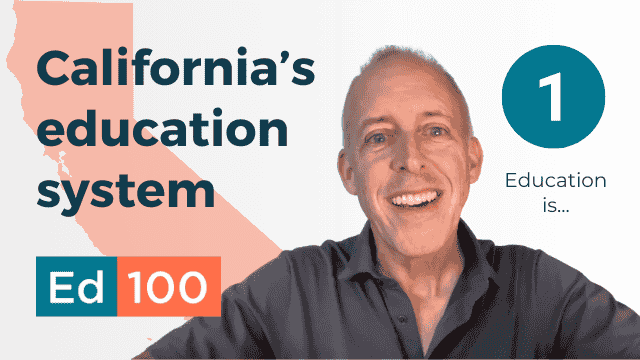
By age five or six at the latest, American children begin their formal education. The process consumes a huge fraction of their waking hours through adulthood. Taxpayers commit enormous sums to support this system. Families organize their lives around the bell schedule. Why do we do it?
In This Lesson

Why are schools important?
What is the purpose of public education?
What is Ed100’s big picture?
▶ Watch the video summary
★ Try the chapter Discussion Guide
At an individual level, of course, the "why" of education is almost meaningless. School is compulsory. It's what we're expected to do! Also, education is the only path to a job that seems to reliably lead to a living wage. Remember the old saying: "If you think education is expensive, try ignorance!" (Probably written by Robert Orben, a comedy writer and speech writer for President Ford, but popularized by Ann Landers, a.k.a. Eppie Lederer.)
The remarkable, revolutionary idea behind universal public education is that all young people are worth investing in.
At a societal level, the remarkable, revolutionary idea behind universal public education is that all young people are worth investing in, for reasons that are both philosophical and practical. We have a shared stake in an educated society and an educated electorate. Our society values the individualistic ideal that a person's place in the pecking order should be earned rather than inherited. Everyone should have a shot.
The public education system, even with its flaws, is among the biggest collective investments we make in our society. It is crucially important for public health, through universal vaccination. It is an expression of our belief in social mobility, and in the potential of each person to contribute something to this world we share. It is essential to the social commitment to preserve human society on a finite planet with a changing supply of water and liveable land.
If that doesn't move you, most folks agree that they would rather pay for schools than for jails or soup kitchens.
The COVID-19 pandemic helped remind the public that schools also play an important role for adults. It's hard to work when the kids aren't in school, right?
Why are schools important?
The high level goals are easiest to agree on: we all want our children to emerge from their school years healthy and prepared for college, work, and citizenship.
Bill Honig, a former Califonia Superintendent of Public Instruction, described public education has having three purposes:
- Job preparation,
- Active civic participation, and
- Leading a full life.
Over a period of decades, a polling firm (PDK) has periodically asked a sample of Americans to choose the single main purpose of public education from a short list of just three options. Consistently, about half choose "Preparing students academically" as the main purpose, with the remainder split between "preparing to be good citizens" and "preparing for work".
This feels like an incomplete answer, doesn't it? As a whole, we want schools to help our children realize their potential. We expect students to be armed with certain fundamental skills such as literacy and numeracy.
Beyond the practical matters, however, we also expect schools to help transform children into adaptable, decent, and broadly capable adults. Things change. Each big wave of technology has disrupted the world: print, oil, electricity, vaccines, plastics, computing, the internet, mobile phones — each has transformed the nature of work and life in unexpected ways. Artificial Intelligence (AI) promises to be every bit as disruptive. In an evolving society and a dynamic job market, we cannot pretend to know exactly what skills a child will really need.
This idea is far from new. The headmaster of Eton school, William Johnson Cory, explained his views on the purpose of education in 1861. Imagine the passage below being read by Albus Dumbledore…
"At school you are not engaged so much in acquiring knowledge as in making mental efforts under criticism..."
At school you are not engaged so much in acquiring knowledge as in making mental efforts under criticism... you go to...school not so much for knowledge as for arts and habits; for the habit of attention, for the art of expression, for the art of assuming at a moment's notice, a new intellectual position, for the art of entering quickly into another person's thoughts, for the habit of submitting to censure and refutation, for the art of indicating assent or dissent in graduated terms, for the habit of regarding minute points of accuracy, for the art of working out what is possible in a given time; for taste, for discrimination, for mental courage and mental soberness. Above all, you go to a great school for self-knowledge.
— William Johnson Cory, Headmaster at Eton, 1861
This lesson concludes the introductory chapter of Ed100. The core lessons of Ed100 are organized into ten chapters with a big picture in mind: "Education is Students and Teachers Spending Time in Places for Learning with the Right Stuff in a System with Resources for Success. So Now What?"
We have created many resources to help leaders make use of Ed100 — have a look at our toolbox!
The next lesson will shift the focus to students.
Updated May 2025
Quiz×
CHAPTER 1:
Education is…
-
Education is…
Overview of Chapter 1 -
California Education
Are California’s Schools Really Behind? -
American Education
Are U.S. Schools Behind the World? -
Education and the Economy
Schools for Knowledge Work -
Educational Failure
The High Social Costs of Bad Apples -
Grade Inflation
Wishful Thinking and Cognitive Bias -
Are Schools Improving?
Progress in Education -
History of Education
How have Schools Changed Over Time? -
Purpose of Education
What are Schools For, Really?
Related
Sharing is caring!
Password Reset
Search all lesson and blog content here.
Login with Email
We will send your Login Link to your email
address. Click on the link and you will be
logged into Ed100. No more passwords to
remember!














Questions & Comments
To comment or reply, please sign in .
Gail Arenberg October 1, 2019 at 3:26 pm
Michael Berger September 27, 2020 at 11:07 pm
francisco molina August 13, 2019 at 12:36 am
LeeAnn Corral January 21, 2024 at 5:58 pm
Jeff Camp - Founder March 27, 2018 at 12:09 pm
Caryn-C September 18, 2017 at 11:59 am
If I were to ask my fourth grader why he goes to school, he would say "friends". School without friends is insufferable. So I would add that to the list-- for the art of cultivating friendship.
Rachele Latham November 4, 2016 at 9:36 am
Carol Kocivar October 28, 2016 at 12:43 pm
A 2016 poll finds that not everyone agrees.
"Fewer than half of Americans (45%) view the main goal of public education as preparing students academically; the rest split between a focus on preparing students for work (25%) or preparing them to be good citizens (26%)."
2016 PDK poll of the Public’s Attitudes Toward the Public Schools http://pdkpoll.org/timeline/2016
Jeff Camp - Founder July 30, 2016 at 10:35 pm
Mark MacVicar April 20, 2015 at 11:54 pm
Jeff Camp - Founder April 21, 2015 at 12:34 am
jenzteam February 27, 2015 at 7:56 am
Education, even with all its flaws, is our biggest collective investment in societal ideals of social justice and social mobility. It is an expression of our belief in the potential of each person as a contributor to this world we share. And if that doesn’t move you, most folks agree that they would rather pay for schools than for jails or soup kitchens. And who wants the kids just hanging around, getting into trouble? Better at school than at home, right?
We live in a caste system where education is not for everyone. It is for those who are pushed or strive to achieve a higher style of life. Not everyone is set out to achieve this high style life - it is always a choice. Everyone has potential. It is what you choose to do with that potential that defines you.
Brandi Galasso February 8, 2015 at 9:39 pm
Dianna M February 5, 2015 at 12:19 pm
https://prezi.com/9zj_tyve4dyb/how-to-change-education/
Jeff Camp - Founder February 5, 2015 at 6:23 pm
Greg Wolff March 9, 2011 at 3:52 pm
In the book, they argue that we simultaneously expect schools to perform all these "jobs" and more. That's one reason it's so hard for everyone to agree on a single direction.
Of course, this debate will never really be settled, we can agree that in the common view, "Schools are FOR children" and try to make sure we keep their needs front and center while considering the many issues related to education. Hence the next topic: Students!
http://www.disruptingclass.com/
Pages 52-64